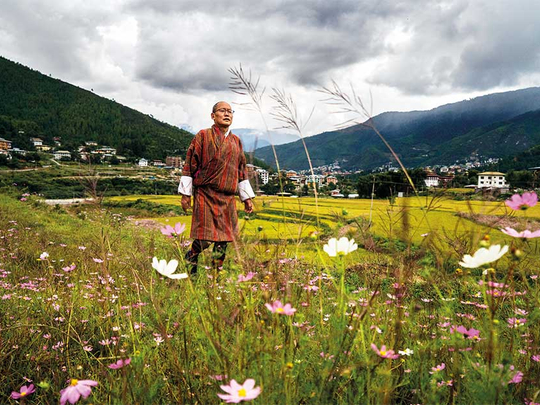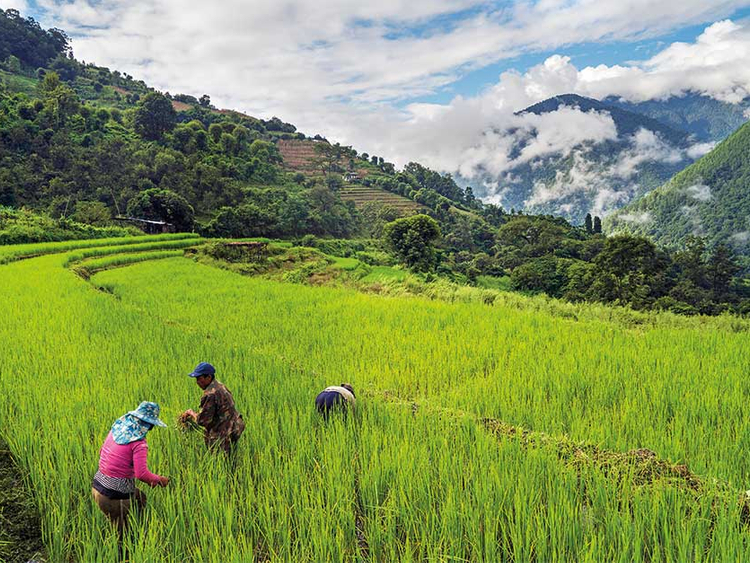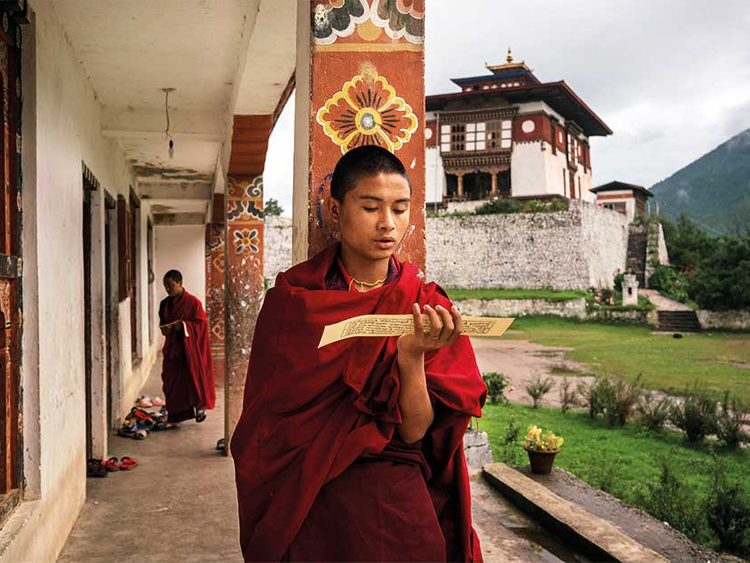
As a downpour settled into a thick fog outside, Dasho Karma Ura let his eyes flicker at the ceiling of a wood-panelled conference room and began expounding on the nature of happiness.
“People feel happy when they see something ethical,” he said. “When you think you have done something right and brave and courageous, when you can constantly recharge yourself as a meaningful actor.”
“And lastly,” he added, thumbing Buddhist prayer beads, “something which makes you pause and think, ‘Ah, this is beautiful. Beautiful, meaningful, ethical’.”
Ura, 55, is perhaps one of the world’s leading experts on happiness, at least as seen through the lens of development economics. It has been something of a preoccupation for more than two decades as he has developed and fine-tuned Bhutan’s Gross National Happiness indicator, a supplementary, sometimes alternative, yardstick to the conventional measure of development, gross domestic product.
As the president of the Center for Bhutan Studies and GNH Research, Ura has spent much of his time asking Bhutanese questions about interactions with neighbours, quality of sleep and physical vigour in an attempt to understand and measure subjective well-being. Over the years, he has watched the idea catch on far beyond Bhutan, a remote kingdom in the Himalayas.
When Denmark repeatedly came in first on the World Happiness Report, which looks at the science of measuring quality of life, more people became aware of both the report, and the concept behind it.
As nations struggle with what Ura called more “guns, bullets and bombs” than at any other time in history, he said it was imperative that many more countries devise indicators that look beyond economics.
“We have to find new ways of organising our drives and energies towards peace and harmony,” he said. “We have to sincerely find a way out of it, out of this mutual insecurity. Because you have more guns, I have to have a little more guns. The long-term collapse is facing us.”
While Gross National Happiness has become a political tool around election time, Ura believes the index has drawn greater attention to social problems. And the results appear to be positive, he said.
In 2015, his staff members released a study that showed 91.2 per cent of Bhutanese reporting that they were narrowly, extensively or deeply happy, with a 1.8 per cent increase in aggregate happiness between 2010 and 2015.
Those who were educated and lived in urban areas reported higher levels of contentment than their rural counterparts. Men reported feeling happier than women.
Bhutan’s Constitution, which went into effect in 2008 with the transition to democracy, directs the kingdom’s leaders to consult the four pillars of Gross National Happiness — good governance, sustainable socioeconomic development, preservation and promotion of culture, and environmental conservation — when considering legislation.
Born into an agricultural community in central Bhutan, Ura said his childhood was marked by changes that brought him closer to a world beyond farming. In the 1960s and 1970s, Swiss investors, taken with his district’s alpine terrain, helped develop road and water systems. The introduction of a formal education system in Bhutan gradually upended the mindset of many villagers, who felt schooling took away from responsibilities at home.
After graduating at the top of his class in Thimphu, Bhutan’s capital, Ura was sent to St Stephen’s College in India, where he at first pursued history. By the time he reached Oxford in 1983, he had begun a longer foray into philosophy, economics and politics.
When he returned to Bhutan in 1988, he was taken aback, first with the condition of the country’s libraries, which he called “extremely rudimentary”, and then with the way an “industrialising, Cold War” focus on materialism had started to threaten the country’s Buddhist traditions.
“The metrics of international development agencies were seeping into our language, into our consciousness, into our accountability system,” he said.
During this period, the standard metrics for measuring a country’s progress on the global development scale had come under scrutiny in Bhutan, Ura said. Indicators that looked exclusively at income or a country’s investments were found to miss out on some larger, moral truth, “that aggregate final optimal value which we call happiness.”
The term “Gross National Happiness” had already been coined by King Jigme Singye Wangchuck, who ruled Bhutan until 2006. But the vocabulary remained imprecise, Ura said, and the task of developing criteria to measure happiness as a development tool was passed down to him and his staff members.
Ura maintains that his work has never been about mathematics, but instead about understanding the immediacy and intimacy of a person’s experiences, which he believes get a country closer to measuring true progress. With something like air quality, for instance, Ura said he was fascinated with people’s perceptions.
“Maybe air is very unpolluted across the country, we know this in Bhutan, but in some pockets you may be breathing very bad air,” he said. “So it is not the objective measurement of air quality, but how do you feel your air quality is around you.”
In an interview, Ura was quick to defer credit for developing Gross National Happiness to Wangchuck. But he has become a more visible advocate internationally.
In 2008, Nicolas Sarkozy, then the president of France, commissioned the economists Joseph Stiglitz, Amartya Sen and Jean-Paul Fitoussi to write a report investigating the usefulness of happiness in development indexes. In 2011, the UN General Assembly passed a resolution inviting member states to consider measures that could better capture the “pursuit of happiness” in development. The first World Happiness Report was released in 2012.
But Ura acknowledged that questions have arisen about whether a happiness indicator was nothing more than a thought experiment praised in elite academic circles and among wealthy nations. Even as the index caught on outside Bhutan, Ura said, persuading other developing countries to look past development conclusions driven by income has been difficult.
“After we become rich. Let’s discuss after per capita income is $10,000,” he said, giving an explanation for why some nations have taken longer to embrace the indicator. “Life is not sequential like this. You don’t say that I want to become rich first and happy later.”
Although Bhutan has its own economic challenges, including one of the world’s highest debt to GDP ratios and a lopsided reliance on India for development, Ura believes a happiness index has remained popular in the country partly for religious and historical reasons.
A Buddhist belief in alleviating suffering has had an effect, he said. But so, too, has the absence of colonialism and extreme poverty. Countries that have been slow to carry out the measure, he said, are often unable to move beyond the “overhang” of traumatic pasts.
“If you go back to the newspapers, continually, under the banner of GNH, these sorts of things are raised which would not otherwise be raised,” he said. If Bhutanese read about an assault, he continued, “people write, ‘In the GNH country, why is this happening?’”
Going forward, Ura seemed realistic about the challenges facing Bhutan’s own implementation of the indicator. As the country has developed, large-scale hydropower projects have driven the economy forward, but they have also displaced some farmers and those living in rural communities, he said.
Ura said ensuring that maximising aggregate happiness did not come at the expense of those on the margins would have to remain a priority. But as Bhutan looks to expand and diversify its economy, he acknowledged that it was difficult to predict the exact calculus for harmonising Gross National Happiness and gross domestic product.
As for the calculus of his own “perfect happy day”, Ura said it involves six hours of “profoundly deep” sleep, an hour-long afternoon walk to a forest and avoiding what many of his fellow citizens might consider a fifth pillar of happiness: Bhutan’s very hot chilies.
–New York Times News Service















